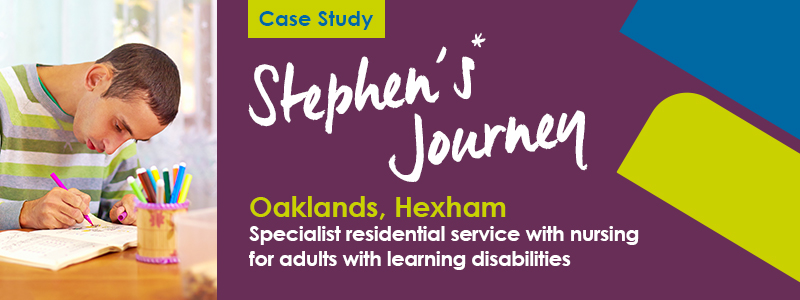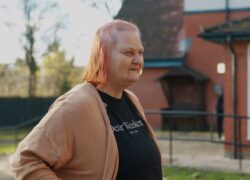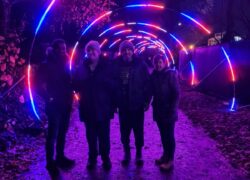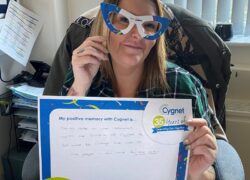
Stephen’s* history
Stephen is a young man with a learning disability, autism spectrum disorder and obsessive compulsive disorder. He lived with his family until his early twenties and had suffered consistent bullying throughout his school years.
Stephen always found sleeping very difficult and would often sleep for periods during the day and go for walks at night. He found his thoughts and emotions difficult to process and lashed out causing damage to the home. After multiple incidents and Stephen becoming verbally aggressive, the police became involved and Stephen faced criminal charges, a family member then took out a restraining order to protect the family and the home.
Stephen was moved to various placements following this including supported living and a purpose built accommodation, all of these broke down within months and Stephen was placed on a section before being admitted to a Psychiatric Intensive Care Unit (PICU).
When Stephen came to us
Stephen’s bespoke single occupancy flat at Oaklands was purpose built for him and was designed to be as safe and robust as possible so that during incidents he could be kept safe and the damage could be minimised.
Even with the high specification building, he managed to break his windows soon after he arrived. He was very unsettled and anxious due to his previous experience of frequent changes in his placements and support staff. His incidents of aggression and destructive behaviours were happening around 3 times a day and he often required PRN medication.
Stephen’s care
The multi-disciplinary team (MDT) recognised that a consistent approach and building routine would be very important for Stephen to establish a trusting relationship. The team were persistent in showing Stephen that they were there to support and care for him and wanted to help when he was struggling.
In co-operation with the local CCG, a special package with the occupational therapist (OT) and speech and language therapist (SALT) was put together and an educational assessment was carried out. It highlighted that although Stephen was a competent reader, his understanding of language wasn’t at the same level. This helped the team to better communicate with him in order to understand his needs and help him feel less frustrated.
Staff began to recognise the signs of Stephen becoming distressed and learned when to intervene and support him to feel calmer, and when to step back and allow him some space. They looked deeper into the causes of his aggressive behaviours and discovered that he struggled with unusual visual experiences when looking at his reflection. This was a key insight into why he had been damaging windows and mirrors as they were particularly distressing for him. The team spent time helping Stephen to find things that he could do to stop himself from feeling overwhelmed, such as breathing exercises and positive distractions.
Staff worked with Stephen to create accessible information points that he could refer to whenever he needed reassurance. They installed a whiteboard in his flat which was completed daily to let him know who would be on shift and what meal options were available so that he could choose to cook for himself. Not only did this reduce his anxiety, but also boosted his daily living skills, independence and his self-esteem.
With Stephen and the team having built a positive and trusting relationship, he was able to access a huge amount of activities both in the home and outdoors. This supported a further reduction in incidents as he loved being busy. They found he especially enjoyed being outdoors and doing physical activities such as walking and football. This also inspired the team to purchase a spinning bike and punch bag, both were great tools for Stephen to burn off some energy which helped him feel more relaxed and therefore able to sleep better.
Getting a good night’s sleep was still an ongoing challenge for Stephen, and the team wanted to support him to have all the tools to not only help him sleep but to help him cope when he couldn’t. They wrote a list together of things he could try to help him relax – he especially found that practising mindfulness with one of the team and getting a hot chocolate helped him feel less distressed.
Stephen today
It is still early days with Stephen’s placement, however as of today Stephen has had no incidents for 5 weeks, he and the team are proud of his improvements and he is motivated to keep using the tools that he has learned to manage his feelings.
PRN medication is used very rarely, if at all, and he has built a fantastic bond with the staff. He is a keen baker and his chocolate cakes are a favourite amongst the team. Stephen is excited about the future and is already planning the activities he’d like to try once the COVID-19 restrictions are lifted, one being a local climbing centre.
Stephen is regularly spending time with his family and enjoys their visits, they have commented on how well he is doing and are very happy to see him so settled.
Stephen’s current goal is to continue to improve on his daily living skills enabling him to increase his independence.




